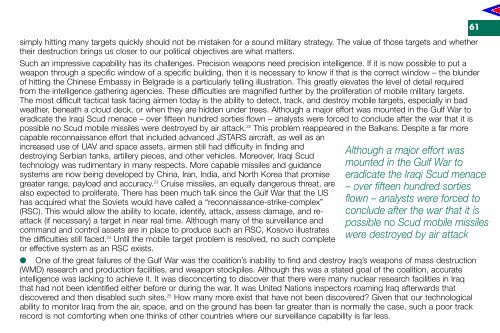THE RAF AIR POWER REVIEW - Royal Air Force Centre for Air ...
THE RAF AIR POWER REVIEW - Royal Air Force Centre for Air ...
THE RAF AIR POWER REVIEW - Royal Air Force Centre for Air ...
Create successful ePaper yourself
Turn your PDF publications into a flip-book with our unique Google optimized e-Paper software.
simply hitting many targets quickly should not be mistaken <strong>for</strong> a sound military strategy. The value of those targets and whether<br />
their destruction brings us closer to our political objectives are what matters.<br />
Such an impressive capability has its challenges. Precision weapons need precision intelligence. If it is now possible to put a<br />
weapon through a specific window of a specific building, then it is necessary to know if that is the correct window – the blunder<br />
of hitting the Chinese Embassy in Belgrade is a particularly telling illustration. This greatly elevates the level of detail required<br />
from the intelligence gathering agencies. These difficulties are magnified further by the proliferation of mobile military targets.<br />
The most difficult tactical task facing airmen today is the ability to detect, track, and destroy mobile targets, especially in bad<br />
weather, beneath a cloud deck, or when they are hidden under trees. Although a major ef<strong>for</strong>t was mounted in the Gulf War to<br />
eradicate the Iraqi Scud menace – over fifteen hundred sorties flown – analysts were <strong>for</strong>ced to conclude after the war that it is<br />
possible no Scud mobile missiles were destroyed by air attack. 22 This problem reappeared in the Balkans. Despite a far more<br />
capable reconnaissance ef<strong>for</strong>t that included advanced JSTARS aircraft, as well as an<br />
increased use of UAV and space assets, airmen still had difficulty in finding and<br />
destroying Serbian tanks, artillery pieces, and other vehicles. Moreover, Iraqi Scud<br />
technology was rudimentary in many respects. More capable missiles and guidance<br />
systems are now being developed by China, Iran, India, and North Korea that promise<br />
greater range, payload and accuracy. 23 Cruise missiles, an equally dangerous threat, are<br />
also expected to proliferate. There has been much talk since the Gulf War that the US<br />
has acquired what the Soviets would have called a “reconnaissance-strike-complex”<br />
(RSC). This would allow the ability to locate, identify, attack, assess damage, and reattack<br />
(if necessary) a target in near real time. Although many of the surveillance and<br />
command and control assets are in place to produce such an RSC, Kosovo illustrates<br />
the difficulties still faced. 24 Until the mobile target problem is resolved, no such complete<br />
or effective system as an RSC exists.<br />
Although a major ef<strong>for</strong>t was<br />
mounted in the Gulf War to<br />
eradicate the Iraqi Scud menace<br />
– over fifteen hundred sorties<br />
flown – analysts were <strong>for</strong>ced to<br />
conclude after the war that it is<br />
possible no Scud mobile missiles<br />
were destroyed by air attack<br />
● One of the great failures of the Gulf War was the coalition’s inability to find and destroy Iraq’s weapons of mass destruction<br />
(WMD) research and production facilities, and weapon stockpiles. Although this was a stated goal of the coalition, accurate<br />
intelligence was lacking to achieve it. It was disconcerting to discover that there were many nuclear research facilities in Iraq<br />
that had not been identified either be<strong>for</strong>e or during the war. It was United Nations inspectors roaming Iraq afterwards that<br />
discovered and then disabled such sites. 25 How many more exist that have not been discovered? Given that our technological<br />
ability to monitor Iraq from the air, space, and on the ground has been far greater than is normally the case, such a poor track<br />
record is not com<strong>for</strong>ting when one thinks of other countries where our surveillance capability is far less.<br />
61

















